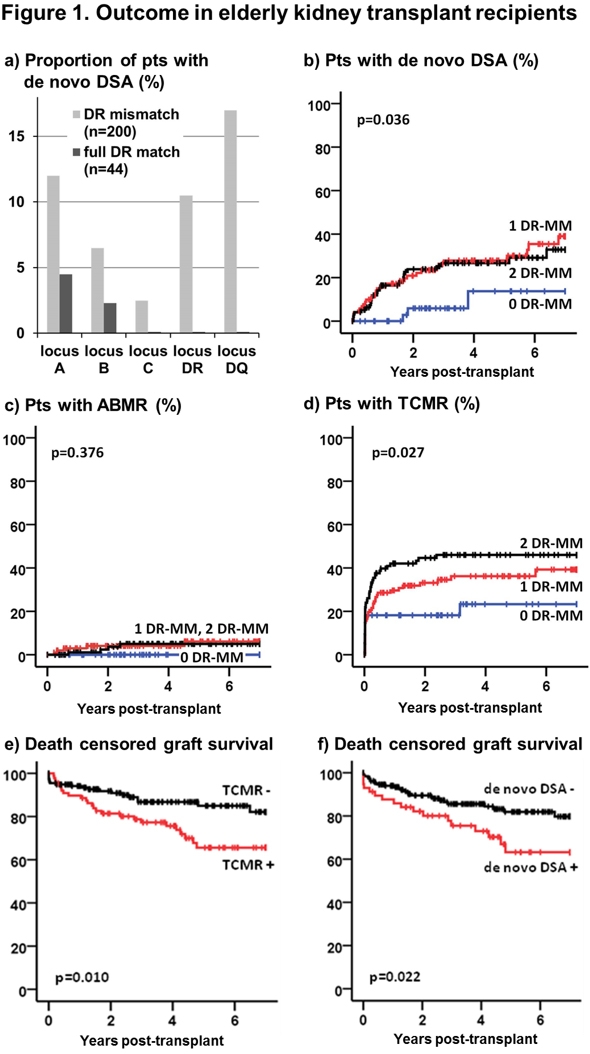Factors Associated with Acute Rejections in Kidney Transplant Recipients: Time for HLA-DR Matching in Elderly Recipients?
Nephrology, Charite Universitaetsmedizin, Berlin, Germany.
Meeting: 2016 American Transplant Congress
Abstract number: 47
Keywords: Age factors, Donors, HLA-DR antigens, marginal, Outcome
Session Information
Session Name: Concurrent Session: Kidney Transplantation: Outcomes, Matching and Marginal Donors
Session Type: Concurrent Session
Date: Sunday, June 12, 2016
Session Time: 2:30pm-4:00pm
 Presentation Time: 3:42pm-3:54pm
Presentation Time: 3:42pm-3:54pm
Location: Ballroom B
Background. Within the Eurotransplant Senior Allocation Program (ESP) HLA-matching is neglected,potentially causing inferior outcomes. There is a lack of data analysing the long-term immunologic outcomes in elderly kidney transplant recipients (KTR).
Methods. This retrospective study included 972 KTR between 2004 and 2014. Data analysis included patient and graft survival, biopsy proven rejections (T-cell mediated rejections (TCMR) and antibody mediated rejection (ABMR)) and the development of de-novo DSA. KTR were further categorized according to age in 728 younger (<65) and 244 elderly (≥65 years) KTR and furthermore according to HLA-DR matches.
Results.
Elderly KTR showed significantly shorter time on dialysis (44 vs. 61 months), shorter cold ischemia time (CIT) (9 vs 12 hours), more HLA mismatches (4 vs. 2) and a higher proportion of DGF (46% vs. 29%). In the subgroup of elderly KTR there was a higher incidence of de novo DSA (33% vs. 25%, p=0.034) and TCMR (39% vs. 27%, p<0.001) at 7 years post-transplant.A multivariate analysis adjusted for all relevant factors revealed donor age (HR 1.01; p=0.044), CIT (HR 1.02; p=0.064), delayed graft function (HR 2.88; p<0.001) and HLA-DR mismatches (HR 2.19; p<0.001) as independent predictors for TCMR. Older recipient age however was protective (HR of 0.99 per year, p=0.002).
Within the group of elderly KTR, an increasing number of HLA-DR mismatches was associated with a significant higher risk for TCMR (p=0.027) and development of de novo DSA (p=0.036), while there was no significant difference regarding ABMR (Fig 1a-d). Occurrence of TCMR or de-novo DSA in elderly KTR resulted in significantly poorer graft survival (p=0.010 and p=0.022 respectively) (Fig 1e-f). 
Conclusions. HLA-DR mismatches are a strong independent risk factor for TCMR and the development of de-novo DSA in elderly KTR, both significantly worsening graft survival. Introduction of HLA-DR matching in ESP might significantly improve immunologic outcomes.
CITATION INFORMATION: Khadzhynov D, Halleck F, Lehner L, Duerrr M, Kleinsteuber A, Schmidt D, Budde K, Staeck O. Factors Associated with Acute Rejections in Kidney Transplant Recipients: Time for HLA-DR Matching in Elderly Recipients? Am J Transplant. 2016;16 (suppl 3).
To cite this abstract in AMA style:
Khadzhynov D, Halleck F, Lehner L, Duerrr M, Kleinsteuber A, Schmidt D, Budde K, Staeck O. Factors Associated with Acute Rejections in Kidney Transplant Recipients: Time for HLA-DR Matching in Elderly Recipients? [abstract]. Am J Transplant. 2016; 16 (suppl 3). https://atcmeetingabstracts.com/abstract/factors-associated-with-acute-rejections-in-kidney-transplant-recipients-time-for-hla-dr-matching-in-elderly-recipients/. Accessed February 23, 2026.« Back to 2016 American Transplant Congress
